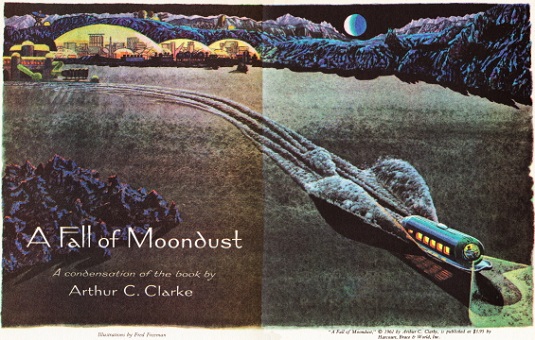
My expectations weren't very high for A Fall of Moondust, a Poseidon Adventure-style rescue caper set on the lunar surface. The plot is not the world's most riveting either. With space travel between the Earth and the permanent Moon colony a fixture of the 21st century, space tourism is a thing and punters happily shell out the cash for cruises across the lunar surface. For Captain Pat Harris and hostess Sue Wilkins, the latest foray across the sea of dust in the skimmer, Selene, is another routine sightseeing trip. Unfortunately, as they're speeding across the sea an underground expulsion of gas creates a sinkhole analogue just as they're passing over. The ship is immediately buried without nary a trace of it left on the surface. Facing problems with heat, air, and supplies, can the crew and passengers hold out until they are rescued? On the Moon, is rescue even possible?
Fall is not the most sophisticated novel, but it is a very good one. Shock horror a break with the consensus! The usual criticisms about character apply, and because it's 1961, the gender norms and a quick racial aside dates it. But as a straightforward SF thriller, it works. Taken on his own terms, for Clarke science fiction was the literature of exploration - a thought experiment of fantastic but just-about-plausible scenarios and conceivable future tech within the limits of the science of his day. Fall works as the mapping out of how a disaster might unfold on the Moon, and what engineering challenges would have to be overcome to pull off a successful rescue in hard vacuum. A lot of Clarke's description of the environment and geology was well realised, and perhaps his speculation did have an affect on NASA planners who were worried the Apollo landers might sink into the dust.
But what I took from Fall was a distillation of the postwar zeitgeist. The economic boom, the rapidly rising living standards across the West, the celebration of expertise in popular culture and the can-do resolution of problems through the application of science and technology suffuses the book. It also works as a paean to the lost world of collectivism in the British mode. The Selene's crew are unflappable, not given to panic, and see the safety of the passengers as their first duty. The engineering team that rush to the crash site are protected from the glare of global media interest by the distance between themselves and the TV cameras on a nearby mountain, and the anonymising sun shades of their space suits. There is no hyping up of the individual, despite one of the passengers being a famous astronaut travelling incognito, and life after Selene is not one of celebrity and media deals. This was simply a group of people pulling together and doing what was expected of them with a minimum of fuss, and then getting on with their lives. A reminder that an unshowy, cooperative individualism is a submerged - as if buried under tonnes of Moon dust - part of our cultural present, but still one that comes to the fore at moments of acute crisis.
Is A Fall of Moondust hauntological? Yes, it is. But its modernist impulse, the conception that a better future is possible, is certainly one our time of socio-political and environmental disasters could do with gripping hold of again.
Image Credit
3 comments:
Gosh - this was one of the earliest 'modern' sci fi novels I read as a child. I loved it then, probably just as a straight adventure story. It was a very long time ago! You have made me want to re-read it. Thank you.
I'm surprised by what you say about Clarke's contemporary reputation. I have always thought of Clarke as basically the pinnacle, along with Asimov. (Only Cixin Lui matches up, in terms of contemporary writers). The reason is that Clarke actually knew so much science, and there is therefore a basic "realism" to his stories, therefore you can get involved in them because you can believe that this might really be our future. (I bet that if you were to extract predictions from his novels, and Asimov's, they'd be among the most accurate). Yes, his writing is pretty poor, but ALL sci-fi writing is terrible.
I'm guessing you haven't read much new wave SF, like Keith Roberts. Clarke doesn't have a great reputation now in terms of literary merit but as novels of big ideas that, along with Asimov, is still recognised.
Post a Comment